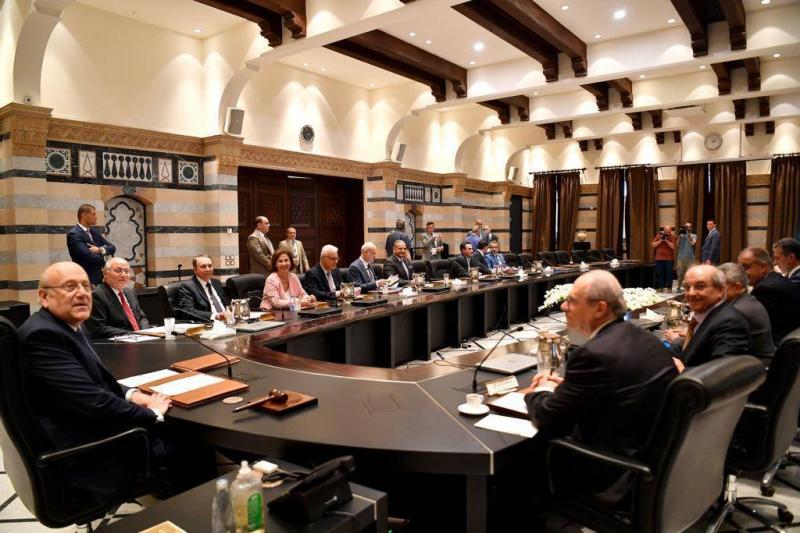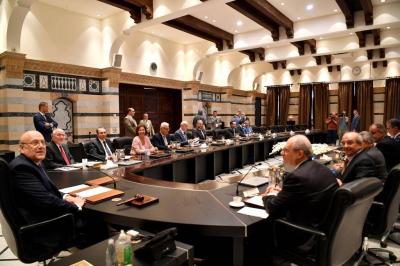Prime Minister Najib Mikati emphasized at the beginning of the Cabinet session that "by the end of June, we will be unable to pay salaries if additional appropriations are not approved by the Parliament, despite available liquidity in the treasury accounts and a good collection of state revenues, noting that May was the month with the highest revenues in a long time."
Regarding the presidential issue, he stated: "We all hope that the democratic process is carried out correctly and that a president is elected. Unfortunately, the evident indicators suggest otherwise, pointing to ongoing disparities among council members and parliamentary blocs, and consequently, the continuation of negative stagnation that prevents the completion of constitutional institutions by electing a president."
He added: "In light of this significant challenge, we must continue our work to address key issues and keep the state moving, within available means, and we primarily seek to assist public sector employees in navigating this difficult phase. I know the efforts each of you is putting forth in your ministry."
Mikati requested public sector employees to "not respond to positivity with negativity, especially since in the last Cabinet session we initiated the payment of seven salaries as an advance on salaries." He added: "The remaining four salaries will be paid by the fifteenth of this month, and we aim for the public sector to continue its work."
**Military and Security Promotions**
He noted that "in recent days, a file concerning promotions in military and security sectors has been raised, and some sought to politicize this issue. From our standpoint of care for military and security forces, which parallels our care for the homeland, as military and security are inseparable, I stress that this file has reached the Prime Minister's office following referral from the Ministers of Defense and Finance as per regulations. We will hold a session at the beginning of next week to approve this file. Simultaneously, I have communicated with both the Ministers of Interior and Defense, requesting the Minister to present a proposal for completing the appointments in the Military Council."
He said: "The topics of promotions and appointments are not interdependent; the promotions file will be presented to the Cabinet for a decision in the session at the beginning of next week. The promotions file was put back on the table after the Army Commander visited me and requested its approval because it boosts the morale of army officers, as did the Minister of Interior and the Director General of Internal Security Forces."
**Syrian Displaced Persons**
He explained that "on our session agenda, we also have the file of Syrian displaced persons, where I asked the Minister of Foreign Affairs to represent Lebanon at the Brussels conference, after doctors advised me not to travel following my recent health setback." He stated: "Today, we will discuss a unified working paper that expresses the position of the Lebanese government as a whole, which is a conclusion of discussions and recommendations from the ministerial committee that convened on April 23rd. Here, I must thank Minister of Displaced Persons Issam Sharafeddine for his follow-up and continuous communications with our brethren in Syria regarding this file."
**Session Resolutions**
At the end of the session, Minister of Information Ziad Makari, during his reading of the Cabinet decisions, announced the approval of a consensual agreement with French lawyers to assist the head of litigation at the Ministry of Justice in the case brought by the French state before the French investigating judge concerning the case of Anna Kossakova and her associates. The lawyers are Emmanuel Dawood and Pascal Bouffet.
Regarding the issue of Syrian displaced persons, he said that "the council decided to reaffirm the government’s initial and final stance regarding the necessity of the dignified and safe return of Syrian displaced persons to their country in accordance with international resolutions, particularly with Resolution 2254, which entails direct coordination with the Syrian side through a ministerial delegation headed by the Minister of Foreign Affairs and Expatriates Abdullah Bou Habib, with the membership of Ministers of Displaced Persons, Social Affairs, Labor, Culture, Tourism, Agriculture, Information, the Secretary-General of the Supreme Defense Council, and the Director General of General Security, also tasked with coordinating with the joint committee of the Arab League regarding Syria."
He added: "The council also decided to assign the Minister of Foreign Affairs and Expatriates to convey this position to the participants in the 'Brussels 7' conference, and to be guided by the broad outlines outlined in the working paper that was discussed in the session."
**Minister of Economy**
Economy and Trade Minister Amin Salam pointed out that "one of the problems facing us is the issue of wheat, for which we have strived between the Ministries of Economy and Agriculture to develop the cultivation of soft wheat, even within certain annual percentages. However, it is a good start, and this current season promises both soft and hard wheat, and we have a duty to support farmers and purchase their wheat crops."
He explained: "In today’s session, we did not discuss this issue in detail, but in the next session, Minister of Agriculture and I will provide all the details and the extent of the need, and we will set a number with the cost to ensure it since we are obliged to purchase wheat as part of the food security basket."
**Minister of Agriculture**
For his part, Agriculture Minister Abbas Al-Haj Hassan stated: "The issue of wheat is strategic for food security in all countries of the world; today we import no less than 23,000 tons and have planted no less than 15,000 hectares of wheat of the flour-type class, and the results are very promising. However, the most important thing remains purchasing the crop, whether soft or hard wheat or barley."
He added: "We cannot continue to purchase all our wheat needs; the government must commit to buying the entire season under a mechanism that has been established because farmers cannot bear additional burdens regarding storage."




